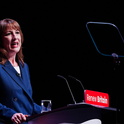George Osborne: our very own Wilkins Micawber
This was undoubtedly a pre-referendum Budget. Osborne's speech was aimed at convincing people he was still in control of the country's economy, despite the worrying slowdown in growth across the world. It was aimed at convincing them that any growth the UK enjoys is down to his statesmanship and skilful policy-making, and that it could all be put at risk if Britain voted to leave the EU.In the run-up to the Budget, the Chancellor had warned us that a fiscal re-think was needed in light of the struggling world economy. A number of monetary authorities, including the Bank of Japan and the European Central Bank, had moved to negative interest rates amid worries about deflation and a possible recession. The Office for Budget Responsibility's (OBR) optimism of last autumn (communicated by Osborne in his Autumn Statement) could no longer hold. So the growth forecasts accompanying the Budget was duly scaled down, and by more than most people expected. The forecasts for this year were downgraded from 2.4 per cent to just 2 per cent, up again to 2.2 per cent next year, before settling down to 2.1 per cent until the next Parliament in 2020.
This forecast came closer to a number of private sector forecasts (for example, the one by the British Chambers of Commerce), which have recently been revised. But the growth profile presented by the Chancellor is still below recent forecasts by the Confederation of British Industry, the British Chambers of Commerce. And also the IMF, which was still expecting the UK to grow by 2.2 per cent at the time of its February report on Britain's economy.
Politically, one suspects Osborne had to be doubly pessimistic. So he warned about the global economic dangers ahead, but also emphasised that the latest growth forecasts—already downbeat—were dependent on the UK staying in the EU. Osborne of course was at pains to stress that the OBR is politically independent, but then liberally quoted passages from the OBR report warning of significant uncertainty and financial instability during any renegotiations of Britain's relationship with Europe. That echoed the carefully worded, balanced remarks made by Mark Carney, Governor of the Bank of England, to the Treasury Select Committee last week, which were seized on by the "Leave" EU campaign as evidence of his pro-European bias.
Political tensions are running high across the board, which makes it hard for tough economic decisions to be taken. But he still needs to talk the talk and may well have to admit in the end that the books will not be balanced while a weak global and domestic economic environment persists. But the feelgood factor for voters will probably be helped by certain giveaways. The raising of personal allowances has been speeded up, and measures have been taken to encourage saving by the under 40s. Consumers, on whom the economy has been depending, may spend more and more tax revenue may be collected.
But Osborne will be far from universally popular. His self-imposed cap on welfare spending is already in tatters, at least in the short term, due to the the House of Lords voting against his planned reduction in tax credits. This means he must find £3.5bn through spending cuts, which are as yet unspecified. The reduction in some disability payment entitlements make up for only a small amount of his short-term losses.
He had also already given up on a major planned reform of pensions that would have reduced tax relief for pension contributions. There was stiff opposition to this, and he knew that it would have alienated the people who would probably be inclined to vote for Remain in the EU referendum. Similar thoughts were probably behind the decision, which went against expectations, to freeze fuel duty again, despite the fact that this is probably the best time for its introduction given the sharp fall in prices at the pump. Osborne's sugar tax, due to come in in 2018, will raise only some £500m and is in any case ringfenced for primary schools expanding their sports activities.
Ultimately, the Chancellor’s figures don’t add up. To balance the books he is relying on closing tax loopholes, lower interest rates on government debt and some unspecified (and probably hard to come by) additional government spending cuts. He still wants to achieve a budget surplus of £10.4bn by 2019/20, unchanged from earlier forecasts. In truth, his best bet for getting this surplus is if the OBR's economic forecasts prove too pessimistic as the end of the current parliament nears—improved growth would transform his finances. For that he cannot just rely on the global economic environment improving; he needs the UK to restructure, revive and be more productive.
That can only happen with more investment and greater business activity. We should welcome the further reductions in the main rate of corporation tax from 20 per cent to 17 per cent by 2020 rather than the 18 per cent originally planned, the more than doubling of small business rate relief to £15,000 and big reductions in capital gains tax. But a lot more needs to be done—and hopefully will be done in the longer term. I suspect that for the moment, though, all Osborne is interested in is getting through to 23rd June and emerging victorious in the referendum. Then, whatever reforms had to be abandoned for short-term political expediency will end up back on the table.
Now read: George Osborne should have been laughed out of the Commons after giving that Budget












